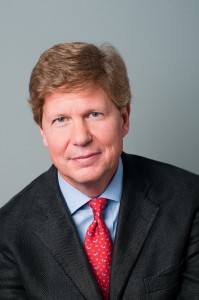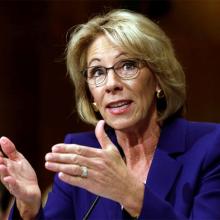public education
Whether I am on an inner-city street, or a remote village, or in a Title I public school classroom, I try to live out my life as Gustavo Gutiérrez describes life among the poor in his book A Theology of Liberation.
The position for which Betsy DeVos has been nominated — secretary of education — is one of the least powerful in the Cabinet, in terms of its budget and position in the line of succession to the presidency.
And yet, after a confirmation hearing in which she struggled to answer questions, some Senate offices have received more calls opposing DeVos than any other nominee.
All 48 Democratic senators and two Republicans — Sen. Lisa Murkowski and Sen. Susan Collins – opposed her when her nomination came to a vote on Feb. 7. Vice President Mike Pence cast a tie-breaking vote.
Later today U.S. Senate confirmation hearings begin for Betsy DeVos, President-elect Donald Trump’s pick to lead the Department of Education. If confirmed DeVos will lead the primary government agency tasked with establishing policy and administering most federal funding for public education and enforcing federal educational laws regarding civil rights.
America is at a crossroads: We live in a society that promotes working for our own ends, but if we are to survive and flourish it is time to start sacrificing for the common good by working together.
In early April, advocates for public education traveled to Washington D.C. for Occupy the Department of Education (Occupy the DOE). Students, parents, educators, and community members came together to protest a current system that is designed to segregate our society, while demanding a public education system that devotes itself to the common good through sacrifice of self for the love of the whole.
Ask a random group of people, “How do we improve our public schools?” and you’re apt to get divergent, passionate answers. Christians, like other citizens, have different opinions on how to heal what’s hurting in our education system. What we can share is a belief that all children are truly precious in God’s sight and an understanding that public education is a key component of the common good—that a healthy school system has the potential to bring opportunity and uplift to children regardless of their economic status.
Jan Resseger is the minister for public education and witness with the national Justice and Witness Ministries of the United Church of Christ. She spoke with Sojourners associate editor Julie Polter in June.
Sojourners: Why is public education a commitment for the United Church of Christ?
Jan Resseger: The commitment to education is a long tradition for us. Our pilgrim forebears brought community schooling and higher education to the New England colonies—New England congregationalism is one of our denominational roots. Another root is the American Missionary Association (AMA), an abolitionist society that grew out of the defense committee for the Africans on the slave ship Amistad. The AMA founded schools for freed slaves as a path to citizenship across the South during and after the Civil War.
Several denominations came together as the UCC in 1957, and our general synods since then have taken stands on issues such as the protection of the First Amendment in public schools and supporting school desegregation through the ’60s, ’70s, and ’80s. From 1958 to the present, we have spoken to institutional and structural racism and classism in schools. We also have addressed privatization, because we’ve been strong supporters for many, many years of public schools as key to the strength of our society and democracy.
THE SO-CALLED “accountability movement” has been a bipartisan movement; virtually no one is proposing that we cut back on standardized tests. They’ve come to dominate school for children and teachers, and they’ve narrowed the curriculum. They’ve caused people to feel pressure to cheat. While standardized tests have been emphasized less in schools where children are highly affluent—those children still get an enriched curriculum—children in schools that are poor get a heavily test-prep curriculum that’s not very enticing.
At a higher level, standardized tests are at the core of the test-and-punish philosophy of No Child Left Behind (NCLB). All the punishments are based on test scores; whether it’s identifying failing schools and closing them if their scores are too low or giving teachers poor evaluations, and maybe firing them, based on student test scores—or whether it’s the very draconian ways of dealing with the bottom 5 percent of schools in the NCLB waivers and Race to the Top grants, as Education Secretary Arne Duncan proposes.
High-stakes testing is at the core of what’s wrong with where we’re headed. Because the stakes are so high, they’ve caused a narrowing of the curriculum. The tests required for NCLB are basic reading and math. They don’t test social studies or the arts. Because the scores matter so much, they’re driving policy all around it.
I'VE BEEN INVOLVED in public education for more than 15 years—as an urban public school teacher, a researcher and policy analyst, a teacher trainer, a parent, and an advocate. I never dreamed I’d live to witness such raucous and juicy debates about how to improve our nation’s lowest-performing public schools. Throughout my career, public education garnered the occasional feel-good story about a phenomenal, mythical “inner city teacher” and, more often, the litany of stories about how urban and rural schools are in complete disarray.
But during the last few years—oh my! We’ve witnessed the onslaught of message-laden documentaries such as Waiting for “Superman” and The Lottery, which are celebrated by many and derided as teacher-bashing propaganda by others. The birth of the “education reform” movement has generated such groups as Democrats for Education Reform, Students for Education Reform, and Stand For Children. Again, lauded by many, these groups are vigorously criticized by others because of the way they push against policies, structures, and institutions in public education.
Regardless of what side of the education reform debate we may choose, most Americans agree on one thing: Public schools must improve. The academic achievement gap between wealthy white students and low-income students of color must be eliminated. It’s unconscionable that 50 percent of kids growing up in poverty drop out of high school. How do we allow a system to exist where poor children in the fourth grade are already performing three grade levels behind children in wealthier neighborhoods? What future do we anticipate poor and minority children will have with these academic outcomes?
JUST OVER A year ago, I attended a retreat sponsored by the Fund for Theological Education. During the retreat we were encouraged to look at our lives and to find a personal story that captured the essence of what led us to our particular ministries. That led me to reflect on my childhood: growing up in poverty, attending a different school every year, walking to school with cardboard in the bottom of my shoes because the soles were worn out, wondering how I was going to eat, lacking school supplies at times, and dealing with the stress of a single mother who was a substance abuser.
By reminding me of those things I endured and had to overcome as a child, that exercise helped me tap into my real passion. I wanted to find ways to help children growing up in similar circumstances. I wanted to inspire them to believe in themselves and know that they can make it.
At-risk youth and under-performing students need to be inspired, but equally important is their need for adults who are willing to do the work of helping them succeed academically. Education continues to be our most reliable tool for creating upward life trajectories and optimal opportunities. Churches are more than places where people come in search of a deeper relationship with God; they are also places where people come to find deeper connections with their communities and the possibility of using their gifts and talents to help those in need.
All these forces together compelled me to act on an idea I had more than a year ago: to call on friends from across the country to help create Faith for Change. Faith for Change builds a national network of churches and people of faith committed to implementing proven educational strategies for improving children’s lives.
Jonathan Kozol, author of Fire in the Ashes, talks about the gripping stories of poor children, the problems of “obsessive testing,” and how to build a school system worthy of a real democracy. An interview by Elaina Ramsey.
 The puzzle here is not that readers of the Bible would tilt toward the political left. That, for me, as well as for thousands of other American evangelicals, is self-evident. Jesus, after all, summoned his followers to be peacemakers, to turn the other cheek, to welcome the stranger and to care for “the least of these.” He also expressed concern for the tiniest sparrow, a sentiment that should find some resonance in our environmental policies.
The puzzle here is not that readers of the Bible would tilt toward the political left. That, for me, as well as for thousands of other American evangelicals, is self-evident. Jesus, after all, summoned his followers to be peacemakers, to turn the other cheek, to welcome the stranger and to care for “the least of these.” He also expressed concern for the tiniest sparrow, a sentiment that should find some resonance in our environmental policies.
No, the real conundrum lies in the subtitle the editors of Christianity Today assigned to Franzen’s article, which was titled, “A Left-Leaning Text.” Adjacent to a picture of a Bible tilted about 45 degrees to the left, the editors added the subtitle: “Survey Surprise: Frequent Bible reading can turn you liberal (in some ways).”
The fact that anyone should register surprise that the Bible points toward the left should be the biggest surprise of all.



